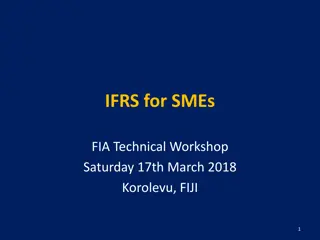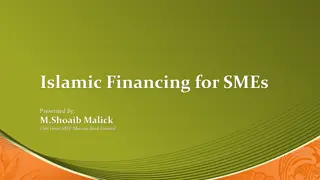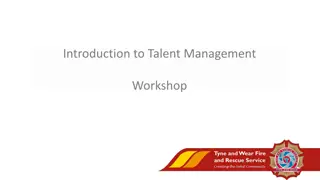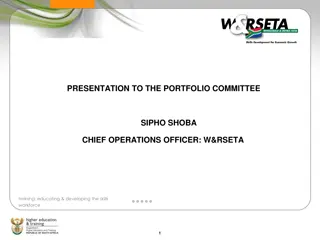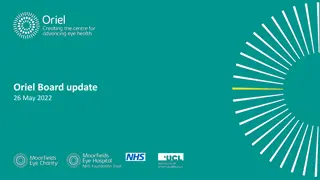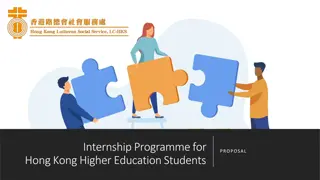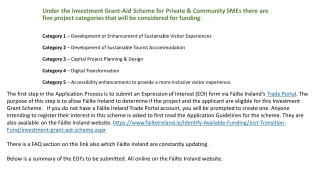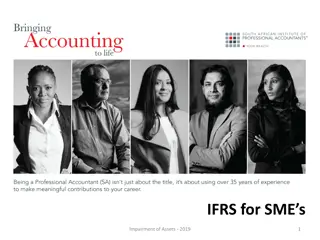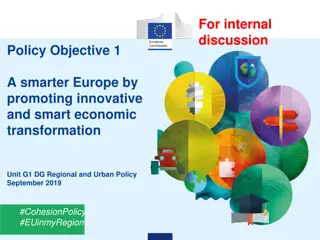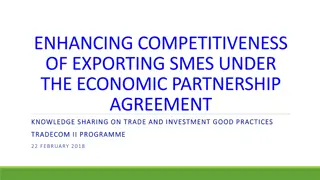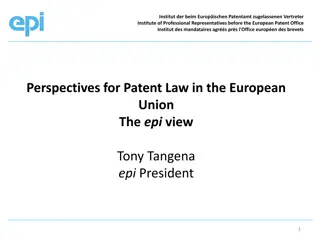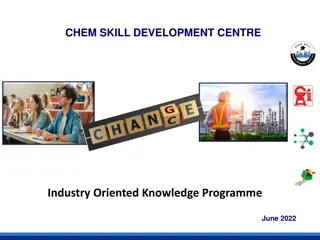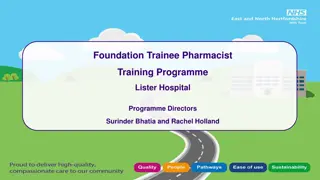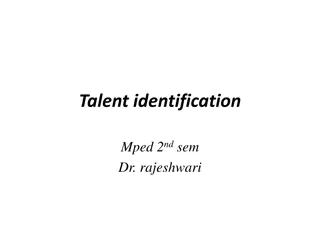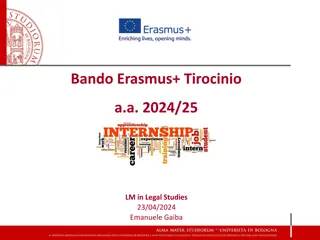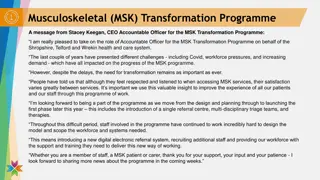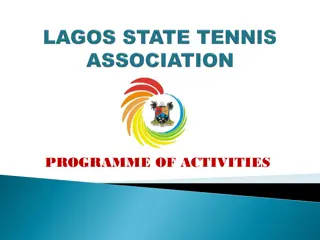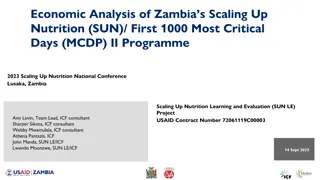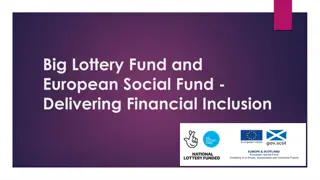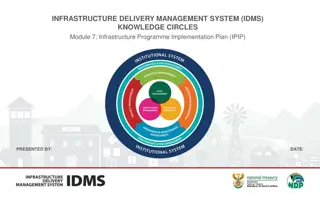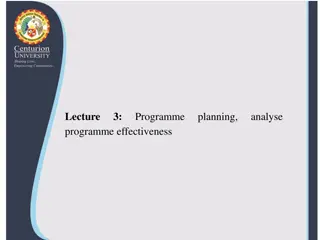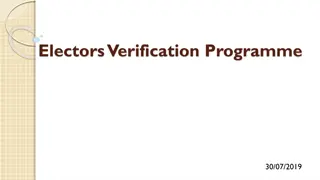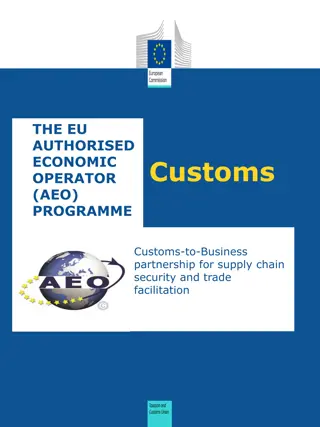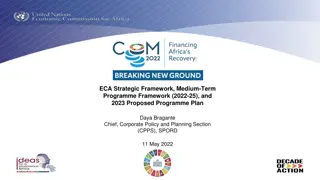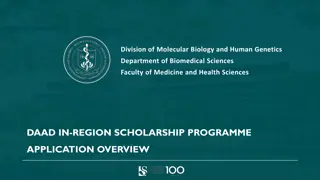Talent 4.0 Management for SMEs Training Programme Overview
Explore the Talent 4.0 Training Programme for SMEs supported by the European Commission. Dive into Talent Management 4.0, understand its importance, and learn practical insights on inclusive talent management models and actions. Discover the impact of social, cultural, and economic factors on SMEs and their talent management strategies. Uncover the essence of Talent Management for Industry 4.0 and create a personalized creed for your business.
Download Presentation

Please find below an Image/Link to download the presentation.
The content on the website is provided AS IS for your information and personal use only. It may not be sold, licensed, or shared on other websites without obtaining consent from the author. Download presentation by click this link. If you encounter any issues during the download, it is possible that the publisher has removed the file from their server.
E N D
Presentation Transcript
Talent 4.0 Talent Management for SMEs Training Programme https://t4lent.eu/ The European Commission support for the production of this publication does not constitute an endorsement of the contents which reflects the views only of the authors, and the Commission cannot be held responsible for any use which may be made of the information contained therein. 2018-1-AT01-KA202-039242
Module 01: Check-in to Talent Management 4.0 Photo by Proxyclick Visitor Management Systemon Unsplash The European Commission support for the production of this publication does not constitute an endorsement of the contents which reflects the views only of the authors, and the Commission cannot be held responsible for any use which may be made of the information contained therein. 2018-1-AT01-KA202-039242
Learning Unit 01: Talent Management 4.0 what is it and why should I buy into it? The European Commission support for the production of this publication does not constitute an endorsement of the contents which reflects the views only of the authors, and the Commission cannot be held responsible for any use which may be made of the information contained therein. 2018-1-AT01-KA202-039242
Learning Outcomes By the end of this learning unit, you will be able to 1. Explain what social, cultural and economic circumstances have an impact on SMEs and their talent management ambitions 2. Identify your understanding of Talent and Talent Management 3. List the typical elements of an inclusive Talent Management model 4. Provide an overview of typical Talent Management actions 5. Discuss what Talent Management for Industry 4.0 could mean 6. Create a creed for your business The European Commission support for the production of this publication does not constitute an endorsement of the contents which reflects the views only of the authors, and the Commission cannot be held responsible for any use which may be made of the information contained therein. 2018-1-AT01-KA202-039242
Defining Talent Societal and economic background Approaches to Talent Management Key elements of modern Talent Management Talent Management 4.0 what could it be? Creating a creed for your business The European Commission support for the production of this publication does not constitute an endorsement of the contents which reflects the views only of the authors, and the Commission cannot be held responsible for any use which may be made of the information contained therein. 2018-1-AT01-KA202-039242
Case Studies Defining Talent (Exercise) Definitions from science and practitioners Importance of finding your own definition The European Commission support for the production of this publication does not constitute an endorsement of the contents which reflects the views only of the authors, and the Commission cannot be held responsible for any use which may be made of the information contained therein. 2018-1-AT01-KA202-039242
Exercise 01 (Worksheet 01.2) What comes to mind when you think of talent? Write down everything Braindump Listen Reflect Case Studies a.) Key features of good employees b.) Key features of outstanding employees Brainstorm The European Commission support for the production of this publication does not constitute an endorsement of the contents which reflects the views only of the authors, and the Commission cannot be held responsible for any use which may be made of the information contained therein. 2018-1-AT01-KA202-039242
Case 01: SocialEquity GmbH Social Enterprise Services and products to impact on social inclusion Working fields: Vocational education for young adults with disabilities Professional development of education professionals (teachers, trainers, etc.) Accessible information Evaluation of social services The European Commission support for the production of this publication does not constitute an endorsement of the contents which reflects the views only of the authors, and the Commission cannot be held responsible for any use which may be made of the information contained therein. 2018-1-AT01-KA202-039242
John A., 39 years old Trainer and Project/Service Developer Education: MA in Sociology; Education in internet design Background in IT as Project Manager Working fields: Organisation and delivery of international courses in digital inclusion and new ways of learning Development of new course offers Development of EU-Projects Photo by Marius Ciocirlan on Unsplash The European Commission support for the production of this publication does not constitute an endorsement of the contents which reflects the views only of the authors, and the Commission cannot be held responsible for any use which may be made of the information contained therein. 2018-1-AT01-KA202-039242
Expertise Writing Skills (Applications, reports, curricula) Knowledge on Erasmus+ funding programmes Digital Skills on web applications for project management and education Performance: Successful development of 5 course offers Delivery of 5 successful Erasmus projects Several Awards Soft skills Reliable & independent worker Great organisational skills High communication skills & experience in group settings 1 on 1 Europe-wide Network in education and training Bridging the gap between technology and its practical application in education. The European Commission support for the production of this publication does not constitute an endorsement of the contents which reflects the views only of the authors, and the Commission cannot be held responsible for any use which may be made of the information contained therein. 2018-1-AT01-KA202-039242
Case 01: YourCareer Inc. Consultancy firm Career guidance for young adults Working fields: Psychometric testing Consultancy of young adults Consultancy of companies The European Commission support for the production of this publication does not constitute an endorsement of the contents which reflects the views only of the authors, and the Commission cannot be held responsible for any use which may be made of the information contained therein. 2018-1-AT01-KA202-039242
Melinda S., 31 years old Supervisor Education: MA in Psychology Working fields: Supervision of psychometric testing Quality Assurance Continuous development of services Photo by CoWomen on Unsplash The European Commission support for the production of this publication does not constitute an endorsement of the contents which reflects the views only of the authors, and the Commission cannot be held responsible for any use which may be made of the information contained therein. 2018-1-AT01-KA202-039242
Expertise Extended knowledge of psychometric testing Deep knowledge of IT-Systems for testing Performance: Smooth operation of all test services over the last 3 years Continuous further development Soft skills Detailed, analytical skills Is able to translate psychological theory to IT demands High problem solving skills Interdisciplinary work orientation High reliability The European Commission support for the production of this publication does not constitute an endorsement of the contents which reflects the views only of the authors, and the Commission cannot be held responsible for any use which may be made of the information contained therein. 2018-1-AT01-KA202-039242
What comes to mind when you think of talent Write down everything Braindump Listen Reflect Case Studies a.) Key features of good employees b.) Features of outstanding employees Brainstorm The European Commission support for the production of this publication does not constitute an endorsement of the contents which reflects the views only of the authors, and the Commission cannot be held responsible for any use which may be made of the information contained therein. 2018-1-AT01-KA202-039242
Wall of Talents 1. Work in pairs: Share your talent profile with a working partner Try to reduce it to a minimum of 3-5 key attributes Draft a profile for one important job role Click on the following link and share your profile on our Talent-Wall 2. 3. 4.
people or a person with a natural ability to do something well , Oxford learners dictationary aptitude which enables someone to achieve unusual or above-average performance in a particular field, particularly in the arts , Duden Fremdw rterbuch Online The European Commission support for the production of this publication does not constitute an endorsement of the contents which reflects the views only of the authors, and the Commission cannot be held responsible for any use which may be made of the information contained therein. 2018-1-AT01-KA202-039242
Conventional definition Talent consists of a combination of two attributes High performance High potential Only the best 3-10% of employees fall into this category Predominant view in the past Focus on key-positions: HiPos, Superkeepers, etc. How can you identify, attract, hire, develop and retain? The European Commission support for the production of this publication does not constitute an endorsement of the contents which reflects the views only of the authors, and the Commission cannot be held responsible for any use which may be made of the information contained therein. 2018-1-AT01-KA202-039242
Inclusive definition of talent business success depends on the performance of all employees every member of staff is equally important and everyone has talent that can be of positive use in future actions talent as potential for the ability to act (von Hehn 2016, p. 6) this talent model emphasizes the importance of recruiting people that fit in the company and to find the best-fit in terms of position/role The European Commission support for the production of this publication does not constitute an endorsement of the contents which reflects the views only of the authors, and the Commission cannot be held responsible for any use which may be made of the information contained therein. 2018-1-AT01-KA202-039242
Talent Management refers to those organizational concepts and measures that specifically deal with the recruitment, assessment, retention and development of current or future employees who are designated as talents because of their comparatively scarce, highly demanded key competencies that are crucial for the organization. (Ritz and Sinelli 2018, p.14, own translation) Talent Management System is an organizational approach that aims to make best use of the talent(s) of each member of staff to deal with current and upcoming challenges. It consists of three pillars: Strategy, Culture and HR-Processes. (von Hehn 2016, p.3; own translation) The European Commission support for the production of this publication does not constitute an endorsement of the contents which reflects the views only of the authors, and the Commission cannot be held responsible for any use which may be made of the information contained therein. 2018-1-AT01-KA202-039242
The Integrated Talent Management System by Svea von Hehn Strategy Culture HR-Processes Clear TM- Strategy Aligned with business objectives Agree on Indicators Develop instruments Mindfullness leadership Openness for change Willingness to learn and develop HR acts as business partner Attract Identify Recruit Develop Retain Succession etc.
The economy is changing rapidly (Digital) Technology is revolutionizing economies Industry 4.0 Automation of tasks Change of job roles and demands Some sectors are facing massive changes New business opportunities arise constantly Photo by Marvin Meyer on Unsplash The European Commission support for the production of this publication does not constitute an endorsement of the contents which reflects the views only of the authors, and the Commission cannot be held responsible for any use which may be made of the information contained therein. 2018-1-AT01-KA202-039242
The economy is changing rapidly Constant, rapid change becomes normality VUCA (volatile, uncertain, complex, ambiguous) Knowledge intensive services gain importance Value of human capital raises Knowledge Skills Creativity Photo by Marvin Meyer on Unsplash The European Commission support for the production of this publication does not constitute an endorsement of the contents which reflects the views only of the authors, and the Commission cannot be held responsible for any use which may be made of the information contained therein. 2018-1-AT01-KA202-039242
The economy is changing rapidly Biggest global media company who is not creating any content? Biggest global hospitality company that doesn t own a single property? Biggest global taxi company that doesn t own a single Taxi? Biggest European transport company that owns only one bus? Photo by Marvin Meyer on Unsplash The European Commission support for the production of this publication does not constitute an endorsement of the contents which reflects the views only of the authors, and the Commission cannot be held responsible for any use which may be made of the information contained therein. 2018-1-AT01-KA202-039242
Demographic change Long term structural changes People live longer Birth rate under 1.7 children per woman (OECD) Shortage of potential workforce War for talents Older workforce Retirement of baby-boomers is ongoing Risk of loss of (tacit) knowledge Knowledge transfer Succession planning Photo by Yiran Ding on Unsplash The European Commission support for the production of this publication does not constitute an endorsement of the contents which reflects the views only of the authors, and the Commission cannot be held responsible for any use which may be made of the information contained therein. 2018-1-AT01-KA202-039242
Social changes New generations enter the labor market Majority of workforce Millennials (Gen. Y) Generation Z starts now Generation Alpha will enter in 5-10 years New generations will work in jobs that do not exist today Values are changing Technology becomes normal/ more important Work-Life Balance more important than career Eco-Awareness Photo by Yiran Ding on Unsplash The European Commission support for the production of this publication does not constitute an endorsement of the contents which reflects the views only of the authors, and the Commission cannot be held responsible for any use which may be made of the information contained therein. 2018-1-AT01-KA202-039242
Climate change will impact global economy Agrarian land will disappear or its cultivation needs to change Coastal regions are threatened (metropolitan areas like Miami or NYC) Sub-Saharan regions are threatened to dry-out Different industries are threatened (like fishing industry) or face massive changes These changes will create mass migrations of Climate refugees that will impact on different levels (social harmony; labor markets, etc.) Disruption of supply chains (availability of natural resources is affected) Photo by Patrick Hendryon Unsplash The European Commission support for the production of this publication does not constitute an endorsement of the contents which reflects the views only of the authors, and the Commission cannot be held responsible for any use which may be made of the information contained therein. 2018-1-AT01-KA202-039242
The people are crucial for success Employee experience comes more into focus (Morgan 2018, p.663) Creating environments where people want to show up (Morgan 2018, p.663) Participation in (strategic) decision-making Changing how organizations operate (from hierarchical to agile and flat) Positively influence willingness and ability to learn and adapt Photo by Yiran Ding on Unsplash The European Commission support for the production of this publication does not constitute an endorsement of the contents which reflects the views only of the authors, and the Commission cannot be held responsible for any use which may be made of the information contained therein. 2018-1-AT01-KA202-039242
People & technology become more important Organisations and their people need to become Open to learn and develop Agile and flexible Tech-ready Digital competent Resilient Sustainable TM-Strategy and actions need to reflect the above in order to attract, identify, develop and retain the right people for the right positions. The European Commission support for the production of this publication does not constitute an endorsement of the contents which reflects the views only of the authors, and the Commission cannot be held responsible for any use which may be made of the information contained therein. 2018-1-AT01-KA202-039242
Blueprint is defined as a set of principles, that guides organisations strategic and tactical talent management processes. It consist of a creed and a talent management strategy (Berger & Berger 2018, p. 3). A creed is composed of a widely publicized set of core principles, values and mutual expectations that guide the behaviour of an institution and its people (ib., p.3) Photo by Mohamed Hassan from Pixabay. The European Commission support for the production of this publication does not constitute an endorsement of the contents which reflects the views only of the authors, and the Commission cannot be held responsible for any use which may be made of the information contained therein. 2018-1-AT01-KA202-039242
The creed guides the whole business and the talent management strategy and processes: Selection criteria Competency definitions Performance assessment Development planning Retention processes Succession planning Photo by mohamed Hassan from Pixabay. The European Commission support for the production of this publication does not constitute an endorsement of the contents which reflects the views only of the authors, and the Commission cannot be held responsible for any use which may be made of the information contained therein. 2018-1-AT01-KA202-039242
Examples Johnson & Johnsons Credo Starbucks Mission Statement Preparatory Exercise Read through the creeds and answer the following questions: What do they have in common? Are there any values or guiding principles that you can identify with? Photo by mohamed Hassan from Pixabay. The European Commission support for the production of this publication does not constitute an endorsement of the contents which reflects the views only of the authors, and the Commission cannot be held responsible for any use which may be made of the information contained therein. 2018-1-AT01-KA202-039242
Exercise 02 (Worksheet 01.2) Brainstorming on guiding values and principles General Customers Employees Society Draft your creed Short sentences Clear message Use We.. Photo by mohamed Hassan from Pixabay. The European Commission support for the production of this publication does not constitute an endorsement of the contents which reflects the views only of the authors, and the Commission cannot be held responsible for any use which may be made of the information contained therein. 2018-1-AT01-KA202-039242
Summary/Conclusion 1. 2. A definition of Talent is highly individual and depends on the context. Modern Talent Management considers the potential of each employee rather than only focusing on high potentials. Talent Management is not only an HR task but a broad approach that includes business strategy, company culture and HR processes. The world is changing rapidly and unpredictably. For being able to deal with these changes we must change in almost all areas of our business actions and processes. We should put people in the centre of our TM-Attention . A clear and simple creed should be the starting point of your TM-efforts. 3. 4. 5. 6. 7. The European Commission support for the production of this publication does not constitute an endorsement of the contents which reflects the views only of the authors, and the Commission cannot be held responsible for any use which may be made of the information contained therein. 2018-1-AT01-KA202-039242
Sources Slide 16: Oxford Learners Dictionary, accessed on 19.02.2020: https://www.oxfordlearnersdictionaries.com/definition/english/talent?q=talent Duden Fremdw rterbuch; accessed on 19.02.2020 https://www.duden.de/rechtschreibung/Talent Slide 18: von Hehn, S. (2016): Systematisches Talent Management Kompetenzen strategisch einsetzen (2.Auflage), Stuttgart, Sch ffer-P schel Slide 19: Ritz, A. und Sinelli, P. (2018): Talent Management berblick und konzeptionelle Grundlagen (3.Auflage, S. 3-32) in Ritz, A. and Thom, N. (2018), Talent Management, Wiesbaden, Springer Gabler von Hehn, S. (2016): Systematisches Talent Management Kompetenzen strategisch einsetzen (2.Auflage), Stuttgart, Sch ffer-P schel Slide 20: von Hehn, S. (2016): Systematisches Talent Management Kompetenzen strategisch einsetzen (2.Auflage), Stuttgart, Sch ffer-P schel Slide 27: Morgan, J. (2018): Eight Trends Shaping the Future of Talent Management Programs, in Berger, Lance A. and Berger, Dorothy R. (2018), The Talent Management Handbook (Third Edition, 2018), USA, McGraw-Hill Education Slide 29: Berger, Lance A. and Berger, Dorothy R. (2018): Using Talent Management to build a high performing work force, in Berger, Lance A. and Berger, Dorothy R. (2018), The Talent Management Handbook (Third Edition, 2018), USA, McGraw-Hill Education
Thank you for watching! The European Commission support for the production of this publication does not constitute an endorsement of the contents which reflects the views only of the authors, and the Commission cannot be held responsible for any use which may be made of the information contained therein. 2018-1-AT01-KA202-039242


